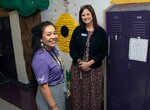



Nettie Baccus Elementary School’s latest achievement is one for the books.
Despite the challenges many have faced in the COVID pandemic the last few years, the campus has still shown significant improvement in its performance as a whole, recently earning a B (88) accountability rating from the Texas Education Agency — an impressive jump from its F (57) rating in 2019.
The TEA accountability rating measures how much students are learning in each grade and whether or not they are ready for the next grade. It also shows how well a school or district prepares their students for success after high school in college, the workforce or the military, according to txschools.gov.
This is the first accountability report released by TEA since 2019, due to two years of COVID-related pauses, according to tea.texas.gov. More than 1,000 districts and 8,000 campuses were rated this year, with returns showing promising signs of progress in Texas’ efforts to have students catch up academically. The 2022 report shows 25% of districts and 33% of campuses improved their letter grade from 2019 — and Baccus is one of them.
Julie Rohleder accepted her position as principal of Baccus after the 2019 TEA report was released.
“I came in with a mission,” she said. “I saw the data and God said, ‘Julie, I think this campus is for you.’ I knew there was a calling of some sort for me to be here. When I walked in this building the first time, I was like, ‘Why is it an F? These kids are awesome.’ The teachers that I saw were doing great things, so I dug into the data and then I realized, they're all doing great things, but they weren't going in the same direction. There were some behaviors and some expectations of culture behaviors for the kids that needed to be tightened and I knew if those things were not tightened as a campus, then we were not going to get deep enough in the learning.”
Rohleder served as a leader for the campus, advising teachers and staff how to improve the campus academically and behaviorally for the students.
ACADEMIC SUPPORT
Every morning from 7:45-8:30 a.m., Baccus hosts Pirate Time, where students break out and go to their individual groups to get the help they need in a specific subject.
The campus also integrated several tactics and programs to help students with various subjects, like Handwriting Without Tears, a program led by Melissa McHugh, special education teacher, to help students with their penmanship.
“We are learning our handwriting skills, print and cursive,” Rohleder said. “We're at an 88 as a campus, and what we're doing now is really working to highlight writing, because the STAAR (State of Texas Assessments of Academic Readiness) is going to be more writing and open response answers for our kids, and we want it to go across curriculum.”
Students in kindergarten through fifth grade have each been tasked with creating a story that will then be posted on their locker for everyone to see.
“The writing samples that are posted outside are stories that students have published. They went through a whole writing cycle from brainstorming to drafting to actually publishing,” Rohleder said.
Francesca “Frenchie” Garcia, interventionist at Baccus, has become integral in educating teachers on the best way to teach writing to their students.
“Once they're published, they go through, and they read what their peer wrote. They get to read each other's writing, get ideas for what they want to do for writing next time, and then once they do that, they go back and set a goal on what they want to get better for next time,” Garcia said. “Then they get to come and hang it out (on their locker) and it gives them pride.”
“When you look around the campus, and you see the visual samples of our kids, and you can see the growth of their handwriting, that is so fun,” Rohleder said. “We are making sure that kids know not just how to do multiple choice, but to know how to do open-ended (responses) and be able to express themselves through that written communication — that will be the transition this year with STAAR and it's gonna affect people and their ratings, and it's gonna affect kids and how successful they are if they're not used to using it. That's what this is all about is just getting kids to love to write. I want to instill in them how to write, to love to write and express their communication through that.”
Math intervention teachers along with instructional coaches, look at data and determine which students need more help in math. Through the program, Do the Math, which is designed to support struggling students in grades one through five, students are then pulled into intervention groups in order to assist them with math problems.
“This is a very integral piece,” Rohleder said. “We've seen a lot of good growth for the kids in math. With COVID we had several gaps, so we had to overcome those gaps and start to close them. We've seen great growth with that.”
Reading interventionists work with the Leveled Literacy Intervention program designed to help struggling readers achieve grade-level competency. LLI is delivered through explicit, direct instruction in a small-group format.
“They're getting the individual students at the level of their reading to help support them there. We make sure that what we pick for these kids is purposeful, intentional, and what they need. We're not wasting time with everything they already know. We build on what they know and individualize for each student,” Rohleder said.
BEHAVIORAL SUPPORT
If a student needs a break or a reset, they will be led to one of the behavior rooms by the school's behavior interventionist.
“She has two different rooms: one room that looks like an ISS (In School Suspension) room and another that has different tools and resources like fidgets, games, trampoline and sensory pads for kids to be able to have an outlet before they get to that frustration or reset moment,” Rohleder said.
FINANCIAL SUPPORT
Communities in Schools, a nonprofit organization that helps at-risk students, is also available at Baccus.
Erika Schat, school social worker, supports about 90 families out of the 470 students enrolled in Baccus.
“We have 82% economically disadvantaged students, so it's a really big deal to have that partnership with Communities in Schools,” Rohleder said. “She (Schat) has clothes closet in here and is able to provide guidance on medical needs, and more even than what I can do as a public administrator. If there's some financial hardships happening, and if they need gas money or something like that, she's able to provide those needs and help with that.”
COLLABORATION
Instructional specialists Kelly Eppler and Jairo Martinez work behind the scenes with teachers, as they dig through and analyze data — and make sure teachers understand what their resources are and how to use them.
Student-led conferences are held twice a year, once in the fall and once in the spring, for parents and children to reflect on the student’s behavior and where they are academically. The campus also hosts Professional Learning Communities, where groups of teachers work collaboratively at the school level to improve student outcomes.
“We meet every other week with each grade level, and during that time, we talk about the data. We talk about the assessments we've given, the data we're getting, how's that driving instruction and helping making intervention and extension groups fluid,” Rohleder said.
PROUDEST PRINCIPAL
Rohleder said one of the main reasons the campus was able to improve from a 57 to an 88 rating is because of the teachers.
“You tell them something, and they take it so much further than I would even think,” she said. “It just makes me the proudest principal ever to see the educators in the classroom doing what they do best. These teachers are phenomenal. Like, this is not me. All I did was come up with some systems and looked for great teachers, and the magic happened.”
As for the future, Rohleder hopes to maintain the B rating, while also striving for that A.
Garcia added that the reason Baccus has been so successful is because of Rohleder and Assistant Principal Melissa Shipp.
“This campus works because they're supportive,” she said. “Like us teachers, we don't work when we don't feel supported. I mean, I drive 45 minutes from Fort Worth because of the leaders that are here. They're always helping and supporting, and they care about the kids. That's why it works here.”
Rohleder added, “We are so blessed. I mean, from teachers to kids to families, we're blessed.”
For more information about Nettie Baccus Elementary School, visit granburyisd.org/baccus.